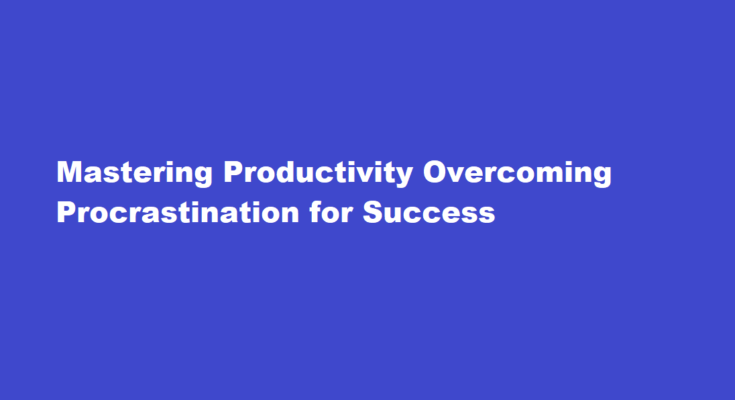Introduction
Procrastination, the art of delaying important tasks in favor of immediate gratification, is a common struggle that plagues many individuals. It hinders personal growth, impacts productivity, and creates unnecessary stress. Breaking free from the grips of procrastination requires dedication, self-awareness, and the implementation of effective strategies. This article delves into the underlying causes of procrastination and provides practical techniques to overcome it, enabling readers to cultivate a productive and fulfilling lifestyle.
Understanding the Roots of Procrastination
Procrastination often stems from a combination of psychological, emotional, and environmental factors. Fear of failure, lack of motivation, and the allure of instant rewards play significant roles in delaying tasks. Identifying the specific triggers for procrastination is essential for devising a personalized approach to tackle it effectively.
Set Clear and Realistic Goals
Defining clear and attainable goals is the foundation of defeating procrastination. Break large tasks into smaller, manageable steps, and establish deadlines for each stage. Setting realistic expectations allows for steady progress and minimizes overwhelming feelings that lead to procrastination.
Prioritize Tasks with the Eisenhower Matrix
Using the Eisenhower Matrix, classify tasks into four quadrants based on urgency and importance. Focus on the important and urgent tasks first, delegate or outsource what’s important but not urgent, and avoid or limit tasks that are neither important nor urgent. This structured approach helps eliminate decision fatigue and ensures time is dedicated to crucial responsibilities.
Create a Productive Environment
The environment we work in significantly impacts our productivity. Minimize distractions by organizing your workspace and limiting access to time-wasting websites or apps. Surround yourself with motivational quotes, plants, or objects that inspire and energize you. A well-designed workspace fosters focus and encourages task completion.
Embrace the Two-Minute Rule
When faced with small tasks that take less than two minutes to complete, tackle them immediately. Responding to an email, making a quick phone call, or tidying up your desk may seem insignificant, but these micro-accomplishments create momentum and reduce the likelihood of procrastinating on more significant tasks.
Practice the Pomodoro Technique
The Pomodoro Technique involves working for a focused period, typically 25 minutes, followed by a short break. After four cycles, take a more extended break. This time management method enhances concentration and prevents burnout, making daunting tasks seem less overwhelming.
Cultivate Self-Compassion
Being overly critical of oneself only perpetuates the cycle of procrastination. Develop self-compassion by acknowledging that everyone makes mistakes and faces challenges. Instead of dwelling on failures, learn from them and use setbacks as stepping stones towards growth and improvement.
Create Accountability
Share your goals with a trusted friend, family member, or colleague who can provide encouragement and hold you accountable. Accountability partners can offer fresh perspectives, valuable insights, and the gentle nudge needed to stay on track.
Develop a Reward System
Design a reward system that celebrates completed tasks and milestones. Treat yourself to activities you enjoy or indulge in a favorite treat after accomplishing significant objectives. Positive reinforcement reinforces productivity and creates a positive association with task completion.
Manage Stress and Procrastination through Mindfulness
Mindfulness practices, such as meditation and deep breathing exercises, can help manage stress and anxiety, which are often underlying causes of procrastination. Mindfulness promotes focus, clarity, and self-awareness, enabling individuals to identify procrastination triggers and respond proactively.
FREQUENTLY ASKED QUESTIONS
Can procrastination be fixed?
There are some time management techniques that are well suited to overcoming procrastination and others that can make it worse. Those that reduce anxiety and fear and emphasize the satisfaction and rewards of completing tasks work best.
Is procrastination my fault?
It’s easy to be hard on yourself when you delay tasks, either at home or in the workplace. But do you deserve self-criticism—or is your procrastination pointing to something more serious? It’s important to know that procrastination is not your fault.
What causes laziness?
Laziness may reflect a lack of self-esteem, a lack of positive recognition by others, a lack of discipline stemming from low self-confidence, or a lack of interest in the activity or belief in its efficacy.
Conclusion
Procrastination is a formidable opponent, but armed with knowledge and the right strategies, anyone can overcome it. Start by understanding the root causes of procrastination and set clear goals with manageable steps. Use productivity techniques like the Eisenhower Matrix and the Pomodoro Technique to stay focused and organized. Cultivate a supportive environment and embrace self-compassion to develop a positive mindset.
Remember, overcoming procrastination is an ongoing process that requires patience and determination. Celebrate progress, learn from setbacks, and continually refine your approach. By making conscious efforts to tackle procrastination head-on, you’ll unlock your true potential and pave the way for a more successful and fulfilling life. So, take that first step today, and reclaim control over your time and productivity!
Read Also : A Comprehensive Guide to Starting Your Own Blog



